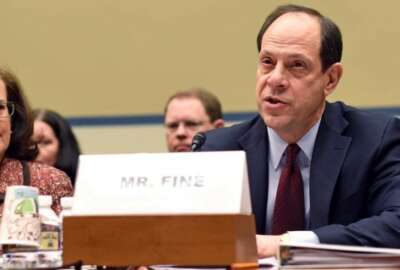Members of Congress regard inspectors general as a smart investment in the annual appropriations process, since they deliver more than $20 in cost savings, on average, for every dollar invested in their offices.
But amid the coronavirus pandemic, the Department of Health and Human Services’ IG office is looking to scale up that investment, having received $400 million in the CARES Act to oversee nearly $2.5 trillion in emergency spending.
In addition to increased work because of the pandemic, the HHS IG office must balance its in-depth reviews with the immediate demand for real-time analysis in the “flash reports” requested by the House Oversight and Reform Committee.
Acting HHS IG Christi Grimm told members of the committee Tuesday that her office had a quick turnaround time to produce a recent report on hospital preparedness leading up to the pandemic.
Since then, the IG office has also had a quick turnaround on fraud alerts and early alerts about issues that present an immediate danger to the public, such as the spread of the virus in nursing homes around the country.
While HHS OIG has 14 pending audits and reviews in the works, Grimm told the committee that her office, even with the increase in resources, has to make tough decisions when it comes to prioritizing its workload.
To triage the caseload that lays ahead, Grimm said her office holds a meeting every week with her “board of directors” made up of the heads of investigations, audits and evaluation and inspection.
The team also includes management, policy, and data experts to deliberate on possible audit ideas and weigh the “opportunity cost for doing one thing versus another.”
“It depends on the topic, it depends on the data, it depends on the availability of staff,” Grimm said. “If you’re asking [us] to do an onsite survey of nursing homes, which is something that we’re doing as part of our coronavirus response work, that takes time and we need to make sure always that we meet our professional standards of conduct before we publish a report.”
HHS OIG always alerts agency leadership about a report before it goes out to the public, and if the pending report includes recommendations, the agency typically has 30 days to provide a response. The IG office also runs each draft report through an internal quality review process before it’s released to the public.
Independence remains ‘cornerstone’ to IG oversight
The IG’s caseload of 14 pending reviews includes reviews of the Food and Drug Administration’s role in providing COVID-19 testing and Centers for Disease Control and Prevention’s distribution of test kits to state public health labs.
However, members of the committee raised concerns about the IG’s independence in conducting these reviews following President Donald Trump’s shakeups in the IG community over the past few months.
Last month, the president fired former intelligence community inspector general Michael Atkinson and named a replacement for former acting Defense Department inspector general Glenn Fine.
That move made Fine ineligible to serve as chairman of the Pandemic Response Accountability Committee, and came less than a week after his appointment to the committee.
Fine was expected to continue in his Senate-confirmed role as deputy DoD IG, but he submitted his resignation on Tuesday.
More recently, Trump also fired State Department IG Steve Linick amid reports that his office looking into alleged misconduct by Secretary Mike Pompeo, which included delegating political appointees to carry out personal errands.
During this shakeup, Trump also nominated assistant U.S. attorney Jason Weida to serve as the next permanent HHS IG, who upon Senate confirmation will replace Grimm, whose Senate-confirmed role is principal deputy IG.
Grimm told the committee that HHS OIG has prepared for a change in leadership since the last permanent IG stepped down in June 2019. But lawmakers still questioned the timing of the nomination, especially after Trump, in a press conference, dismissed some of the HHS IG’s recent findings on the administration’s coronavirus response.
“Ensuring the independence of inspectors general and their ability to work free from political retaliation is the best way to safeguard the trillions of taxpayer dollars that will be spent in response to this crisis and the recovery we know will follow,” Government Operations Subcommittee Chairman Gerry Connolly (D-Va.) said during the briefing.
Committee Chairwoman Carolyn Maloney (D-N.Y.) asked if recent IG turnover has had a “chilling effect” on the watchdog office’s work, but Grimm said her office is moving ahead on 14 pandemic-related audits and reviews, adding that independence remains the “cornerstone” of the 1978 Inspectors General Act.
“I, personally and professionally, cannot let the idea of providing unpopular information drive decision-making in the work that we do,” Grimm said.
About 80% of the IG office’s work is focused on the Centers for Medicare and Medicaid Services, while the remaining 20% looks beyond CMS.
Meanwhile, Grimm said her office has responded to an increase in coronavirus scams. Those include fraudsters targeting Social Security beneficiaries to turn over their Medicare numbers in exchange for fraudulent coronavirus treatments.
Scammers, she added, have also tricked people into clicking malicious links disguised as offers to check if they have been exposed to COVID-19.
“We know from experience that fraud schemes proliferate during emergencies, as greedy perpetrators exploit fear and confusion to steal,” Grimm said. “It is despicable, and it is happening during this pandemic.”
To counter these scams, HHS OIG works with CMS, as well as the Pandemic Response Accountability Committee and the Justice Department.
Copyright
© 2024 Federal News Network. All rights reserved. This website is not intended for users located within the European Economic Area.
